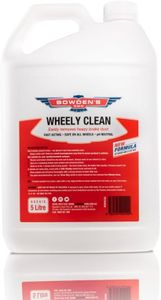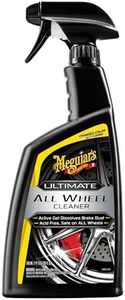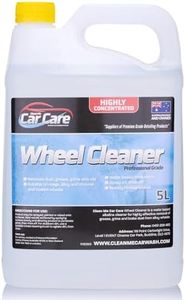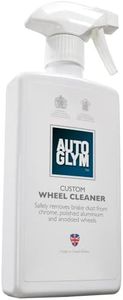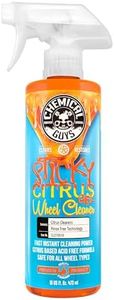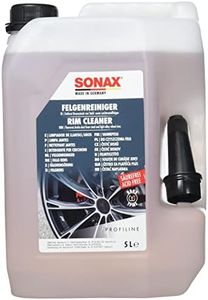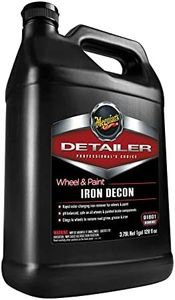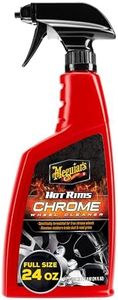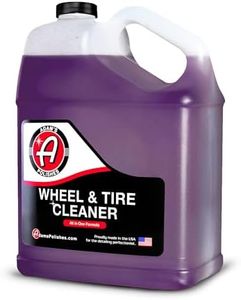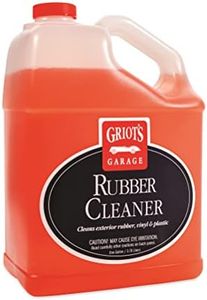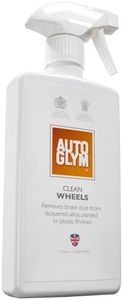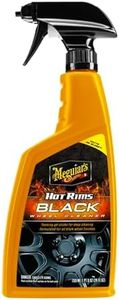We Use CookiesWe use cookies to enhance the security, performance,
functionality and for analytical and promotional activities. By continuing to browse this site you
are agreeing to our privacy policy
10 Best Rim Cleaners
From leading brands and best sellers available on the web.By clicking on a link to a third party's website, log data is shared with that third party.
Buying Guide for the Best Rim Cleaners
Choosing the right rim cleaner can make maintaining your car’s wheels much easier and more effective. The best rim cleaner will help remove dirt, brake dust, and grime without damaging your rims’ finish. Since there are different types of rims and various cleaning needs, it’s important to consider your rim material, your vehicle’s usual conditions, and how much effort you want to spend cleaning. Think about how quickly you want results, how often you'll clean, and any personal sensitives to scents or chemicals.Type of CleanerThe type of rim cleaner refers to its formula base such as acid-based, alkaline-based, or pH-neutral. Acid-based cleaners work quickly and are powerful on tough stains but can be harsh and may damage sensitive finishes like chrome or anodized aluminum. Alkaline-based cleaners are generally milder but still effective for most road grime and brake dust, while pH-neutral cleaners are the safest for all types of wheels, including painted, alloy, and chrome, but may require a little more scrubbing for tough spots. If you have coated or delicate rims, a pH-neutral cleaner is usually best; for heavy brake dust on tougher rims, alkaline or acid-based cleaners might do the job, but always check compatibility with your rim type.
Compatibility with Rim MaterialRims come in many finishes like painted, polished, aluminum, alloy, chrome, or steel. Not all cleaners are safe for every rim type, so it’s vital to check if a cleaner is suitable for your wheels. Look for labels that specify compatibility. If your wheels have a clear coat or are custom-painted, stick to the most gentle, non-acidic cleaners to prevent etching or fading. For basic steel or older, well-worn rims, stronger cleaners may be used more safely.
Ease of ApplicationEase of application covers how you use the rim cleaner—whether you spray it on and rinse off, need to scrub with a brush, or have to leave it to sit for a few minutes. Spray-on, hose-off formulas are the most convenient and least time-consuming, perfect if you want quick results with minimal effort. Others might need scrubbing, which can provide deeper cleaning but requires extra time. If your cleaning routine is quick and you prefer convenience, look for easy application formulas; if thoroughness is your priority, a cleaner that works with brushing might be better.
Scent and Fume SensitivitySome rim cleaners contain strong chemicals that produce strong odors or fumes, which might not be comfortable if you have sensitivities or will be cleaning in an enclosed space. There are low-odor or unscented options that are typically milder. If you’re sensitive to scents or plan on cleaning indoors, choosing a scent-free or low-fume formula is a good idea.
Environmental FriendlinessEnvironmental friendliness refers to whether the rim cleaner uses biodegradable ingredients and is safe for runoff into the environment. Eco-friendly options will be labeled as biodegradable or non-toxic, reducing their impact on plant life and waterways. Select eco-friendly cleaners if you often wash your car on your driveway or lawn, or if you want to minimize your environmental footprint.
Protection and FinishSome cleaners also offer protective coatings that repel future dirt or brake dust, leaving your rims cleaner for longer. These may leave a glossy finish or simply create a barrier to contaminants. If you want to extend the life of your cleaning effort and protect your rim finish, look for products that mention added protection or shine in their benefits.
